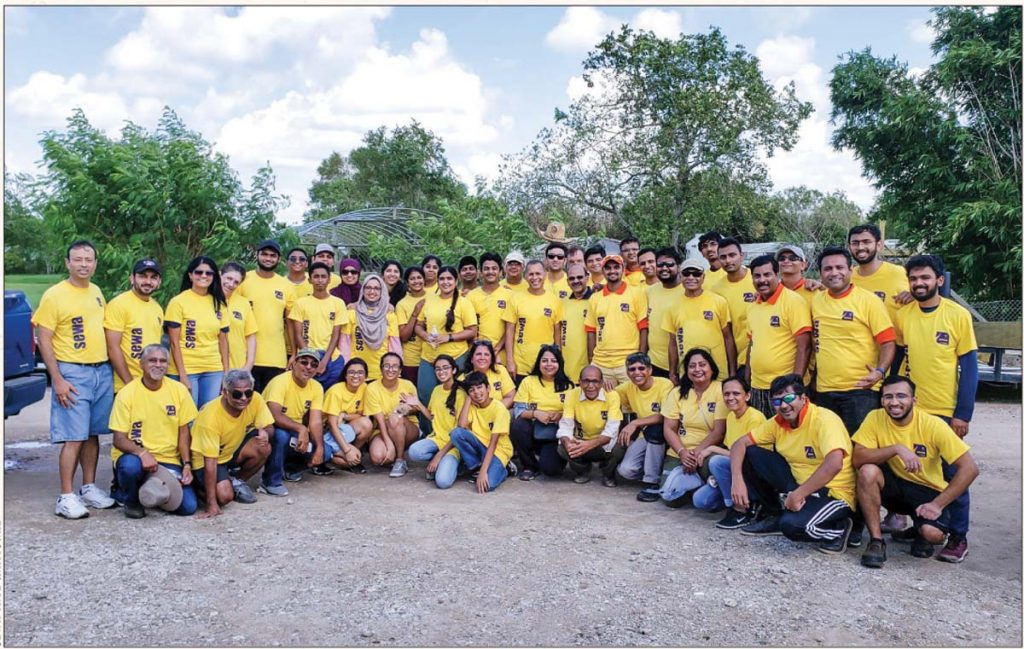Teams from BAPS, HSS and Chinmaya Mission join Sewa International on the front lines to help the most vulnerable during the continuing pandemic
By Vidyasagar Tontalapur, Colorado, US
Sewa international (sewa means service) is a Hindu faith-based Indian-American charity. In March 2020, when the US detected its first Covid-19 infections, Sewa responded by opening non-medical helplines. Within weeks the US economy tumbled, colleges closed and companies laid off workers. Anxious families called in to learn how to protect themselves. Stranded Indian students wanted help to pay apartment rent and buy food. Sewa realized it had to scale up its response as the nerve-racking crisis spread globally.
On March 22, fourteen travelers from India visiting the US rushed to the John F. Kennedy International Airport in New York. Scared of Covid-19, they wanted to return home—but India had closed its airports to overseas flights the previous night. Now penniless, these tourists started searching for housing. They found a gurdwara in Queens, New York, but could not stay long: the Sikh temple soon had to shut its doors to obey the lockdown declared by the state of New York.
Stranded in a foreign city, they called the Indian Consulate in New York. The consulate turned to Sewa International, calling Sewa’s non-medical Covid-19 helpline: “A few travelers from India are stuck in Queens. Can you take care of them?”
Take care of them Sewa did, with warmth and diligence. For two months, volunteers hosted the marooned travelers in Connecticut motels, shifting them from motel to motel a few times when management forced them to vacate in response to other motel guests who became alarmed at having neighbors wearing beards and turbans.
With no restaurants open, the meals were initially supplied by Indian-American homes in New Jersey. One motel opened its kitchen for the travelers, and volunteers brought in pots and pans. Some cooked, others washed dishes as the group started making meals. One person with a cough caused alarm; volunteers took him to a physician and learned that he suffered from a common cold; he tested negative for the novel coronavirus. Finally a chartered Air India rescue flight became available. Sewa workers pooled money to buy flight tickets, arranged a taxi, and sent the stranded visitors home on May 14.
Before leaving, the grateful travelers presented siropas to the volunteers in an emotional get-together. In the Sikh tradition a siropa, a saffron cloth placed around the neck, is a symbol of great honor. Sewa volunteers earned many such accolades as they continued to serve people in distress during the Covid-19 pandemic.
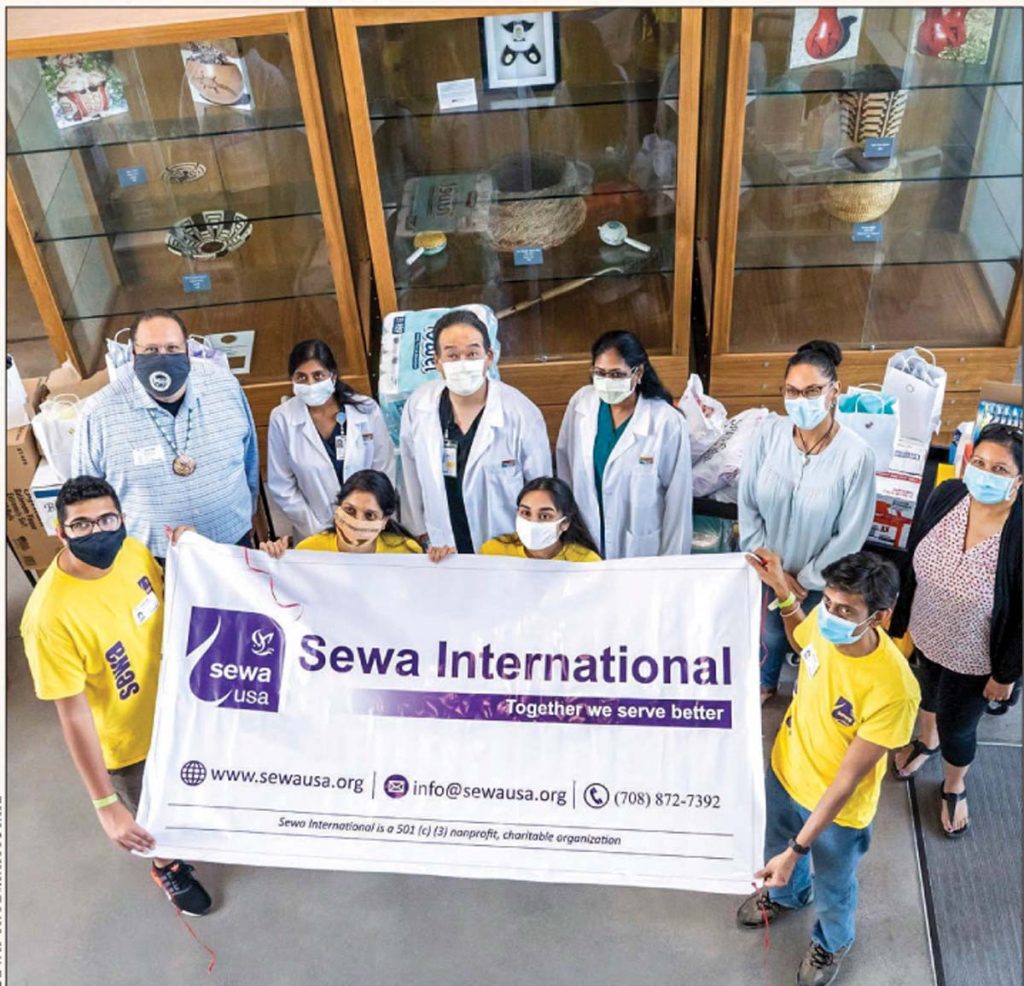
By size and revenue, Sewa is a small charity. It has 4,500 volunteers and received eight million dollars in revenue in 2019. Yet, it achieved what many bigger, wealthier nonprofits failed to accomplish. Sewa made an impact in the community by providing the exact service most needed at the moment. It supplied masks and protective gear to frontline workers who were risking their lives. It distributed food to the hungry and homeless when job losses caused hardship. Its volunteers served people selflessly, expecting nothing in return. They put into practice a principle the Hindu culture and tradition has espoused from time immemorial: vasudhaiva kutumbakam , “the whole world is one family.” All Dharmic traditions—Hindu, Sikh, Jain and Buddhist—adhere to this vision. During the pandemic, temples, gurdwaras, bhajan and kirtan groups joined hands to serve. Language and regional associations, cultural organizations and yoga groups added their might. Together they enabled themselves and their adopted homelands to fight the disease.
Sewa International is present in 26 countries, with 46 chapters in the US alone. The group partners with India’s Sewa Bharati, a non-governmental service organization (NGO) started in 1979. Sewa has provided pandemic relief in many countries besides the US and India. It is active in Canada, UK, Australia, Nepal, Pakistan, Bangladesh and Trinidad & Tobago, to name a few.
Patience, consistency and hard work have helped Sewa make an imprint on the US national nonprofit scene as a charity to reckon with. Founded in India in 1979, Sewa had to wait until 2003 for its US debut. Unprecedented immigration of tech workers from India to the US accelerated its activities in later years. In 2017, when Hurricane Harvey devastated Houston, Sewa dove deep into relief work. Its rescue and rehabilitation efforts received full praise from Houstonians and the US media. During the floods in the Indian states of Gujarat (2017) and Kerala (2018), Sewa saved many lives and restored villages by rebuilding houses and schools.
Gearing Up
A few weeks into the pandemic, the need for protective gear grew severe in the US. San Mateo County, CA, was ready to order a US Air Force plane to pick up N-95 masks from Sewa’s Houston office, but the charity sent the masks by courier. San Mateo’s Covid-19 Incident Commander, Roberto Manchia, wrote to Sewa, lauding the charity for providing vital resources to healthcare workers. “Sewa’s gift of N-95 masks will allow these professionals to fulfill their mission of caring for the sick while staying healthy and able to continue to serve,” he wrote.
An acute shortage of masks had put caregivers’ and frontline workers’ lives at risk. Many Indian-American physicians treating Covid-19 patients were contracting the virus. Requests for masks from doctors and their families and friends flooded Sewa’s Covid-19 WhatsApp groups. The message was unambiguous: people on the frontline fighting the pandemic needed protection. Sewa knew what the community wanted. They had to make decisions and find ways to stem the growing fear in the community.
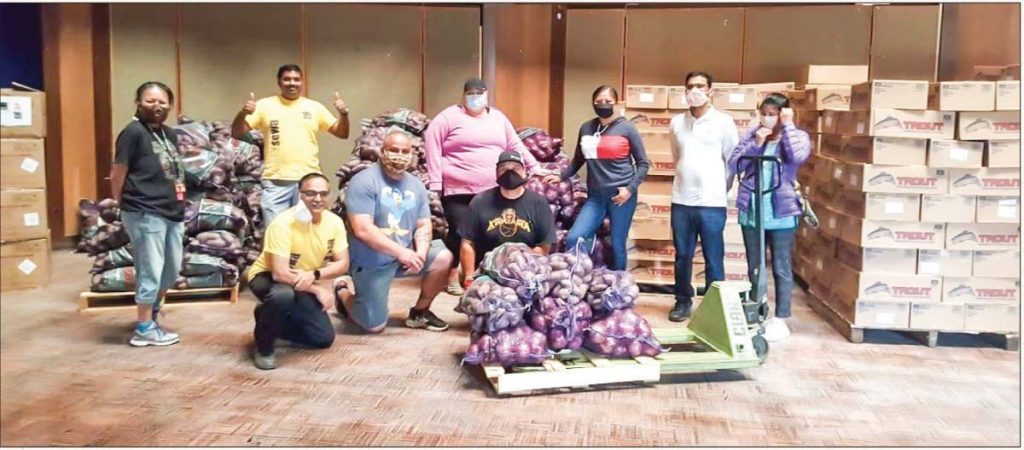
“It tested our ability to respond to an emerging crisis. We had to do what was needed most at the moment. The challenge was to devise a plan to sustain the momentum and continue relief work,” Prof. Sree Sreenath, Sewa’s past president, recalled. He reported that Sewa procured 300,000 masks and hundreds of gallons of sanitizers within a few days. Health clinics thanked Sewa by posting photos of the masks received in their social media messages.
The increasing number of infections and deaths caused a high alert in the country. Like the nodes of a massive banyan tree, volunteers formed small groups across the country. Their homes became virtual war rooms for planning and organizing the complex relief work. A team of 200 physicians, attorneys, career specialists and yogis focused their attention on the health and economic angles of the pandemic. To date, they have conducted 102 webinars on wellbeing, immunity, work and immigration issues.
Next came the Sewa Sankalp initiative, which aimed to combine Dharmic resources to ward off the Covid-19 threat and build cooperation and collaboration among various Dharmic groups. It was an ambitious effort to bring all Dharmic groups together in service to the community. Volunteers sent the Sankalp Patra (a letter of intent) to 1,000 Dharmic organizations, and 500 of them signed the pledge. Several Dharmic institutions gave money, material and volunteers to the Sewa relief work in key cities.
The Dharma Coalition Report prepared by Sewa provides a high-level view of this relief work, featuring 98 Dharmic organizations to start with. Among the many organizations profiled in the report are Hindu Swayamsevak Sangh (HSS), Chinmaya Mission, Vedanta Society, Hindus of Greater Houston, Hindu American Federation (HAF), Arsha Vidya Gurukulam, Gayatri Parivar, Arya Samaj of Greater Houston, BAPS Sri Swamy Narayan Mandir and Gujarati and Jain Samaj. By joining hands with Sewa or working on their own, Dharmic institutions helped soften the blow of the pandemic, serving meals, food packets, milk and other essentials to the needy.
Sewa has distributed 686,500 N-95 and KN-95 surgical and 103,000 homemade masks, and it has served over 100,000 hot meals and food packets across the country. Volunteers served meals at health care facilities, senior care centers and fire stations. They delivered boxes of masks to police stations and county offices. Sewa’s mask drives helped plug a critical gap of protective gear in many cities, including Houston, TX; Atlanta, GA; Fremont, CA; and Parsippany, NJ.
By late August, Sewa’s relief work was gaining traction and slowing the march of the virus. Those without time to volunteer reached for their wallet, donating $1.25 million to the charity. Shifting gears to focus on feeding the hungry, volunteers organized food drives for low-income apartments. They donated $100,000 in cash and groceries to food banks. By the end of October, volunteers had distributed 285,000 pounds of food, vegetables and fruits. The Bay Area Sewa chapter supplied a million dollars’ worth of food and other essentials to the poor.
The Federal Emergency Management Agency (FEMA) organized a virtual Partnership Day in July and posted Sewa’s video in its virtual day exhibit. Sewa International was the lone Hindu charity featured, although others had also been active (see sidebar below). Arun Kankani, Sewa’s president, looks at FEMA’s recognition as a “sign that Sewa’s disaster relief work is of a quality that merits national attention.” It shows how Sewa International brought national recognition to the concept of community service in America.
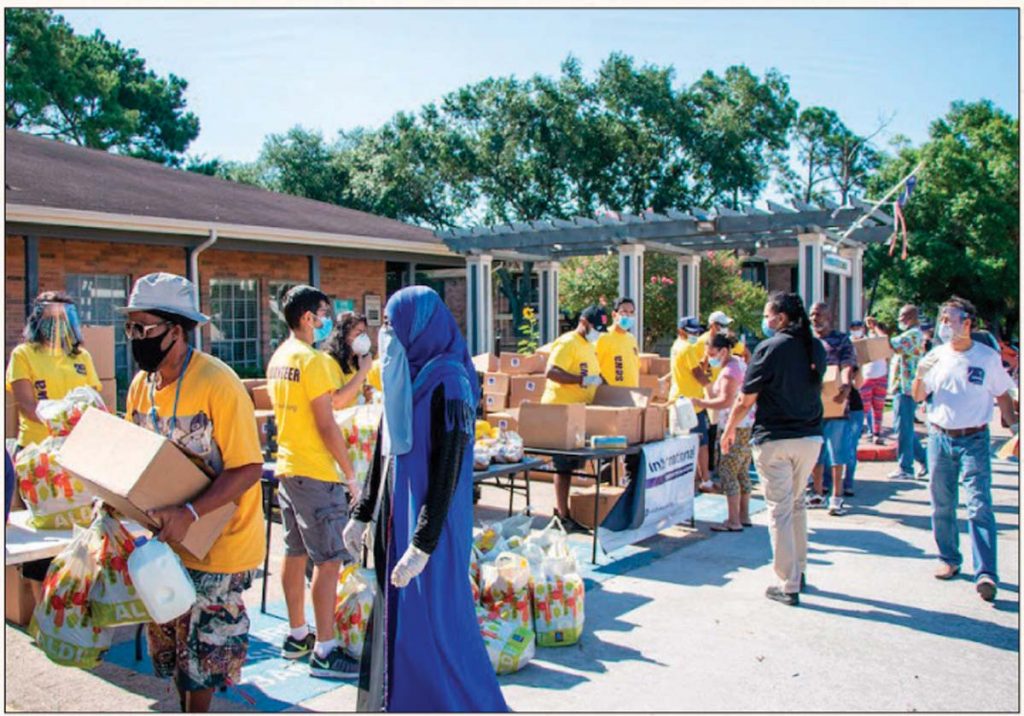
“Service Above Self” and “Unity and Diversity” are two principles that guide Sewa International. They reflect Sewa’s work and its pluralistic ethos that celebrates diversity. Worship, or puja, in the Hindu tradition is akin to sewa to God. Utmost sincerity and devotion mark this Hindu ritual. In the Dharmic worldview, all work is service and worship. Service is devoid of selfishness; it involves sacrifice and is one of the four paths to liberation from worldly bondage. To Dharmic people, the centrality of service is encapsulated in the ancient Hindu adage, “Serving humanity is serving Divinity (Nar Seva Narayan Seva).” As Arun Kankani says, “Seeing service this way should help redefine faith-based nonprofit work in the world by providing dignity and coercion-free service to the needy.”
Helping Hands
Hindu Swayamsevak Sangh (HSS)
The Burmese Buddhist refugee community in Oakland, CA, saw its livelihood disappear early in the wake of the pandemic. Forced shutdowns mandated by the state hit this small community hard. While the spread of Covid-19 made them fearful, dried-up local jobs dealt a severe blow to their income. They sought help from the Alameda Shakha (branch) of the Hindu Swayamsevak Sangh (HSS). Answering their call, HSS launched the “Each One Feed One” campaign. Each family attending HSS’ weekly children program, Balagokulam, adopted one refugee family. For over three months, HSS volunteers provided food kits to the community and helped it endure the crisis.
HSS volunteers in Seattle, WA, helped the local Native American community defeat hunger. They collected 115,000 pounds of potatoes, 100,000 pounds of onions and 36,000 gallons of milk from local farmers and sent them to the native elders in Toppenish, WA. HSS also partnered with Sewa International to send large quantities of food to the Navajo Nation in Arizona. Elsewhere in the nation, about 2,000 HSS volunteers conducted Covid-19 relief operations in 198 cities, helping 45,000 families. They assisted stranded students and delivered masks and hot meals to frontline workers. They also collected and donated money, food and essential supplies to local homeless shelters and food banks. Many Hindu temples and language, cultural and religious organizations collaborated with HSS in the relief work.
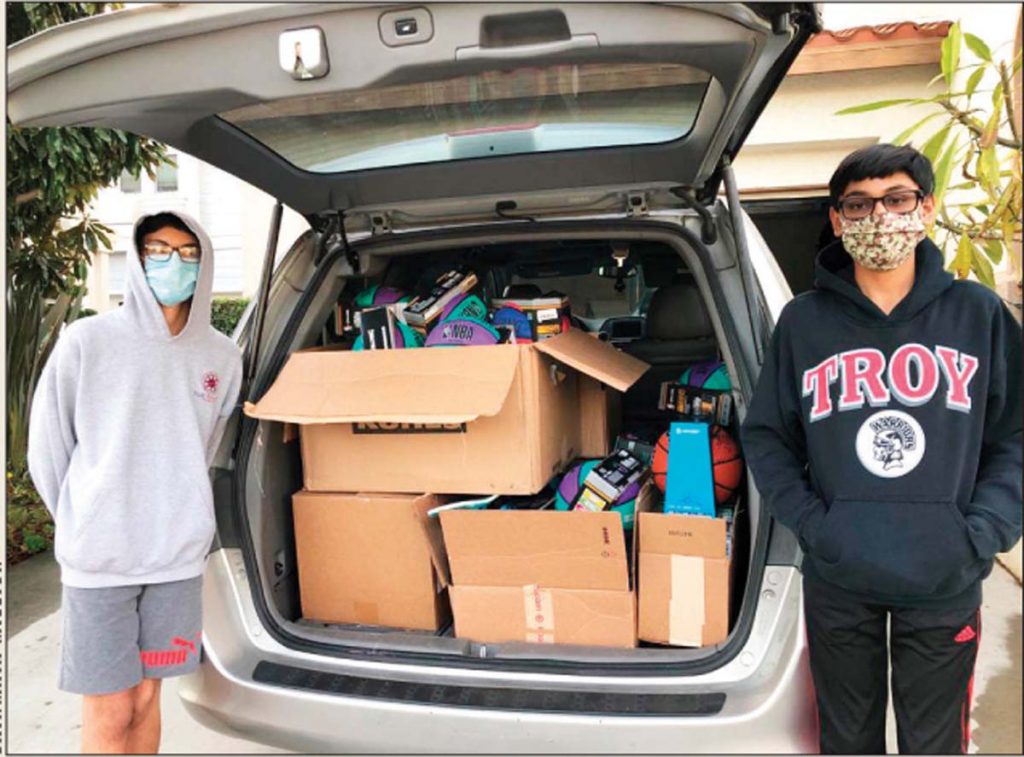
Chinmaya Mission, USA
Swami Chinmayananda said, “Charity must come from within, as an expression of an irrepressible urge of one’s own heart.” These words inspired the volunteers of the organization he founded to serve people during the pandemic. Chinmaya Mission conducted relief activities in various cities in the US, Canada, and Trinidad. The mission distributed over 17,000 pieces of personal protective equipment (PPE) in the US and 20,000 masks in Trinidad. They delivered non-perishable food and essential items in Houston, Chicago, Los Angeles, Seattle, Peoria, IL, and Columbus, OH.
Families attending Chinmaya mission’s Bala Vihar program cooked and served hot meals to healthcare workers and the needy. They delivered groceries, masks, medicines and essential supplies to the vulnerable. The mission donated over $263,600, mostly to local food banks, community centers and hospitals. The children of the Bala Vihar centers did their part by donating their monthly allowance for the pandemic relief work. With matching donations from their parents, the little ones had a bigger impact.
BAPS Charities
BAPS Charities served the frontline workers and provided succor to vulnerable enclaves in many cities. As the charity arm of Bochasanwasi Shri Akshar Purushottam Swaminarayan Sanstha (BAPS), it had a wide reach and impact. Sri Swaminarayan mandirs across the country became nerve centers of the relief work. Headed by the selfless monks of the Sanstha, these temples helped coordinate volunteers and relief work. BAPS volunteers cooked and served over 27,000 hot vegetarian meals in several places. They also provided 30,000 food packages, snacks and beverages to firefighters, police, and the needy. They served food to the entire staff in several hospitals in Los Angeles, Boston, Houston, San Antonio and many other places.
BAPS focused on enabling physicians and nurses treating the Covid-19 patients. It supplied N-95 masks and other personal protective equipment (PPE) to clinics and hospitals. In about six months, they supplied 123,380 units of PPE, including medical gloves and child monitors. Groceries and sanitary items topped the list of items it supplied to county schools, food banks and soup kitchens. BAPS also extended a helping hand to other charities. The charity donated $170,500 to several foundations, health and senior care facilities and community centers.
About the Author
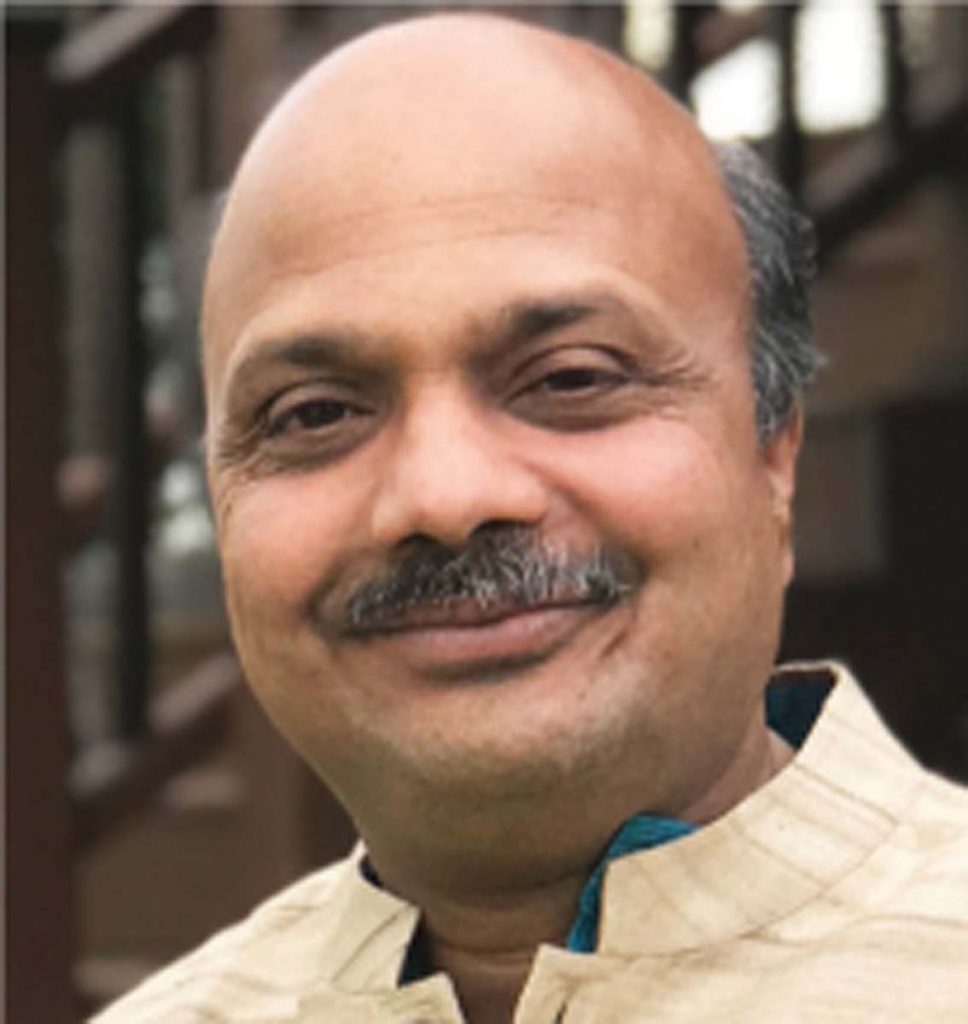
Vidyasagar Tontalapur, a journalist turned software engineer, lives in Superior, Colorado. He is deeply interested in Sanathan Dharma, technology and its impact on society and international affairs. He volunteers as Sewa’s Director of Communications. Writing, nature and travel are his other passions.
